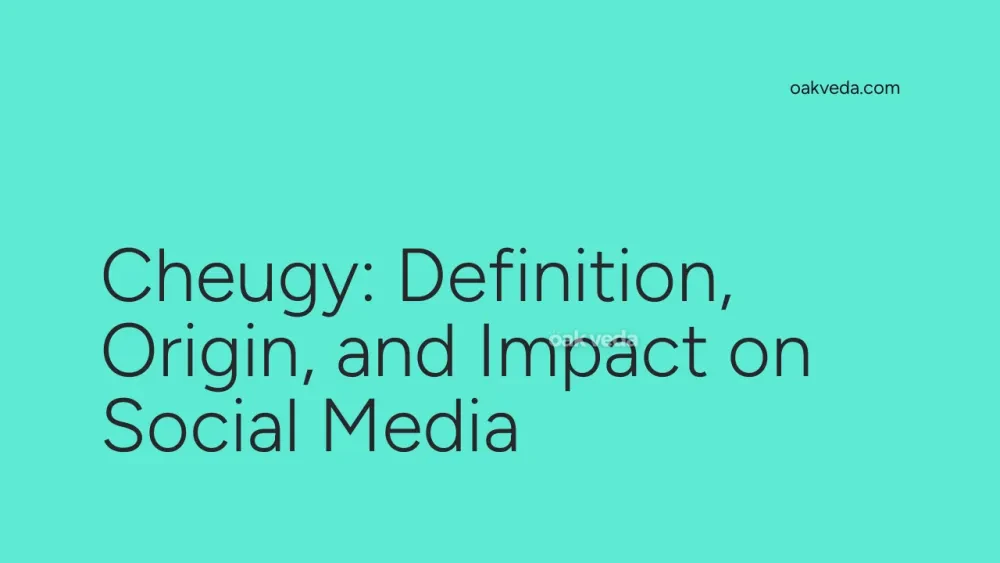
What is Cheugy?
Cheugy (pronounced "chew-gee") is a slang term that has taken social media by storm. It describes something or someone that is outdated, trying too hard to be trendy, or lacking in style and originality. Essentially, it's a way to label things that were once popular but are now considered passé or uncool, particularly by younger generations.
Origin and Development of Cheugy
The term "cheugy" was coined in 2013 by Gaby Rasson, then a high school student in Beverly Hills. However, it didn't gain widespread popularity until 2021, when it exploded on TikTok and other social media platforms. The word quickly became a cultural phenomenon, sparking discussions about generational differences and the ever-changing nature of trends.
How Cheugy Works
Cheugy functions as a cultural critique, often used by Gen Z to poke fun at millennial aesthetics and behaviors. It's a way to identify and label things that are perceived as trying too hard to be hip or cool but missing the mark. The concept is highly subjective and can vary depending on the person using the term.
Types or Variations of Cheugy
While "cheugy" itself doesn't have specific variations, it can be applied to various aspects of life:
- Fashion cheugy: Outdated clothing styles or accessories
- Decor cheugy: Interior design choices that are considered passé
- Digital cheugy: Overused social media trends or outdated online behaviors
- Lifestyle cheugy: Certain hobbies or interests deemed uncool by younger generations
Popular Examples of Cheugy
Some commonly cited examples of cheugy include:
- Skinny jeans and side parts
- "Live, Laugh, Love" decor
- Ugg boots and North Face fleeces
- Obsession with Harry Potter or Disney as an adult
- Chevron patterns and mason jar crafts
- Using certain emoji combinations (like the laughing-crying face)
- Starbucks merchandise and pumpkin spice everything
Impact of Cheugy on Social Media Culture
The rise of "cheugy" has had a significant impact on social media culture:
-
Generational divide: It has highlighted and sometimes exacerbated the cultural gap between millennials and Gen Z.
-
Trend acceleration: The fear of being labeled "cheugy" has accelerated the cycle of trends, with people quickly abandoning styles or behaviors that might be considered outdated.
-
Self-awareness: Many social media users have become more self-conscious about their posts, trying to avoid anything that might be perceived as cheugy.
-
Meme culture: "Cheugy" has spawned countless memes and viral content, further embedding it in online discourse.
Controversies or Debates Surrounding Cheugy
The term "cheugy" has not been without controversy:
-
Ageism accusations: Some argue that the term is ageist, unfairly targeting millennials and their preferences.
-
Gender bias: Critics point out that many "cheugy" things are associated with traditionally feminine interests, suggesting a potential gender bias.
-
Classism concerns: There's debate about whether the concept of cheugy promotes consumerism and classism by pressuring people to constantly update their style.
-
Subjectivity and gatekeeping: The subjective nature of what's considered cheugy has led to accusations of cultural gatekeeping.
How Brands and Influencers Use Cheugy
Savvy brands and influencers have found ways to leverage the cheugy phenomenon:
-
Self-aware marketing: Some brands embrace their "cheugy" status, using it as a marketing tool to connect with their audience.
-
Anti-cheugy campaigns: Other companies position their products as the antithesis of cheugy to appeal to trend-conscious consumers.
-
Influencer strategies: Influencers may deliberately avoid cheugy content or ironically embrace it for comedic effect.
-
Trend forecasting: The concept of cheugy has become a valuable tool for brands and influencers to gauge and predict trend cycles.
Future Trends Related to Cheugy
As with many internet phenomena, the future of "cheugy" is uncertain:
-
Evolution of the term: The meaning and usage of cheugy may continue to evolve, potentially broadening or becoming more specific.
-
Backlash and reclamation: There might be a backlash against the term, with some people reclaiming and embracing their "cheugy" interests.
-
New terminology: As trends continue to cycle, new terms may emerge to replace or complement "cheugy" in describing out-of-touch trends.
-
Academic interest: The concept of cheugy could become a subject of academic study in fields like sociology and cultural studies.
FAQs about Cheugy
-
Is being cheugy always bad? Not necessarily. Many people embrace their cheugy interests, recognizing that personal taste doesn't need to align with current trends.
-
Can something stop being cheugy? Yes, fashion and cultural trends are cyclical. What's considered cheugy today might become trendy again in the future.
-
Is cheugy the same as "basic"? While there's some overlap, "basic" typically refers to mainstream popular trends, while "cheugy" specifically targets outdated trends.
-
How can I avoid being cheugy? The best approach is to be authentic rather than trying to follow every trend. Remember, today's cool is tomorrow's cheugy!
In conclusion, "cheugy" has become a powerful force in shaping online discourse and influencing how people perceive and engage with trends. Whether you embrace or reject the concept, understanding cheugy can provide valuable insights into the ever-changing landscape of social media culture and generational dynamics.
You may be interested in:
- Face Card: Definition, Origin, and Impact on Social Media
- A/B Testing: Definition, Origin, and Impact on Social Media
- TBT: Definition, Origin, and Impact on Social Media Culture
- Fan-Girl: Definition, Origin, and Impact on Social Media
- Cross-Posting: Definition, Origin, and Impact on Social Media
- Bet: Definition, Origin, and Impact on Social Media

